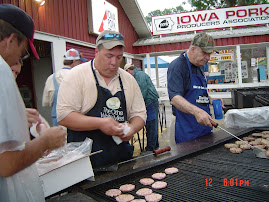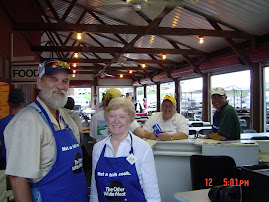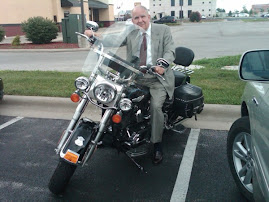JOIN WITH ME IN STANDING ROCK SOLID BEHIND THOSE TRADITIONAL AND CONSTITUTIONAL VALUES THAT HAVE MADE AMERICA THE GREATEST NATION ON EARTH WATCH PART 1 AND PART 2 BELOW, DOUBLE CLICK ON BOTH
LISTEN
WWW
A REAFFIRMATION OF AMERICAN GREATNESS
U.S.Politics
Dr. Phillips Grilling

Iowa State Fair Pork Tent Pork Producers Assn
Mary Beth Phillips at Pork Tent

Iowa State Fair Pork Producers Assn
Dr. Phillips on Police Harley

Bandana Barbeque Springfield Missouri
A Great Farm Family, The John Preussner of Iowa

John, Julie, Ellie, Will and Luke
Monday, January 21, 2013
OP ED
FANFARE FOR THE COMMON MAN OR LONG TERM A COMMON MAN FOR COMPLEX TIMES?
President Obama begins a new term as chief executive and according to one poll has a 47 percent favorable rating in contrast to a 47 percent negative mark from Americans. The U.S. Congress merits only a 16 percent approval from the public sampled. As part of the sample Americans are expressing more interest in the need in coming elections for selecting a “common man” known for honesty, integrity, and true representation of the needs of this great nation in spite of lobbyists, wreck less spending requests and Washington maneuvering. Perhaps we are about to enter the era of our own Fanfare for the common man. Why is that sleeping giant of a request beginning to loom larger in the minds of our fellow citizens?
The great composer Aaron Copeland began his great series of fanfares that utilized this common man musical motif. Composed in 1942 (while Copland was working on his Third and final symphony, which uses a reworked version of Fanfare extensively in its fourth movement). The piece was written in answer to a commission by Eugene Goossens, conductor of the Cincinnati Symphony Orchestra. According to Copland, Goossens, who had commissioned fanfares from British composers during World War I to begin each orchestral concert, had decided to do so again using American composers. Eighteen such fanfares were commissioned by Goosens.
Copland considered several titles including Fanfare for a Solemn Ceremony and Fanfare for Four Freedoms; to the conductor’s surprise, however, Copland titled the piece he wrote Fanfare for the Common Man. Goossens wrote that its title is as original as its music, and I think it is so telling that it deserves a special occasion for its performance. “If it is agreeable to you, we will premiere it 12 March 1943 at income tax time. Copland replied that he was all for honoring the common man at income tax time”. What value, if any, did the founders of this nation place on the common man later valued in music by Aaron Copeland?
OCCUPATIONS OF THE FOUNDERS-1787
The founders of our nation practiced a wide range of occupations, and many men pursued more than one career simultaneously. Thirty-five were lawyers or had benefited from legal training, though not all of them relied on the profession for a livelihood. Some had also become judges. At the time of the convention, 13 individuals were businessmen, merchants, or shippers: Blount, Broom, Clymer, Dayton, Fitzsimons, Gerry, Gilman, Gorham, Langdon, Robert Morris, Pierce, Sherman, and Wilson. Six were major land speculators: Blount, Dayton, Fitzsimons, Gorham, Robert Morris, and Wilson. Eleven speculated in securities on a large scale: Bedford, Blair, Clymer, Dayton, Fitzsimons, Franklin, King, Langdon, Robert Morris, Charles Cotesworth Pinckney and Sherman. Twelve owned or managed slave-operated plantations or large farms: Bassett, Blair, Blount, Butler, Carroll, Jenifer, Mason, Charles Pinckney, Charles Cotesworth Pinckney, Rutledge, Speight, Washington and Madison also owned slaves. Broom and Few were small farmers. Nine of the men received a substantial part of their income from public office: Baldwin, Blair, Briary, Gilman, Jenifer, Livingston, Madison and Rutledge. Three had retired from active economic endeavors: Franklin, McHenry and Mifflin. Franklin and Williamson were scientists, in addition to their other activities, McClurg, McHenry and Williamson were physicians, and Johnson was a university president. Baldwin had been a minister, and Williamson, Madison, Ellsworth, and possibly others had studied theology but had never been ordained. A few of the delegates were wealthy. Washington and Robert Morris ranked among the nation's most prosperous men. Carroll, Houstoun, Jenifer and Mifflin were also extremely well-to-do. Most of the others had financial resources that ranged from good to excellent. Among those with the most straitened circumstances were Baldwin, Briary, Broom, Few, Madison, Paterson and Sherman, though they all managed to live comfortably. A considerable number of the men were born into leading families: Blair, Butler, Carroll, Houstoun, Ingersoll, Jenifer, Johnson, Livingston, Mifflin, Governor Morris, both Pinckney’s, Randolph, Rutledge, Washington and Wythe. Others were self-made men who had risen from humble beginnings: Few, Franklin, Gorham, Hamilton and Sherman. Others were self-made men who had risen from humble beginnings: Few, Franklin, Gorham, Hamilton, Baldwin, Brearly, Broom and Paterson.
FOR MORE INFORMATION, VISIT THE NATIONAL ARCHIVES
http://www.archives.gov/exhibits/charters/constitution_founding_fathers.html
E Pluribus Unum, out of many one. Why are Americans rethinking their nominees for political office and beating a drum as the fanfare for a common man? Are the factors influencing the American ethos in this selection process and what might these characteristics be?
Ascendency of paid lobbyists and their views over the people’s thoughts.
Gradual erosion of Constitutional rights
Weakness in preservation of our borders
Less security and weakening of our military
Rise in crime nationally and in our communities
Rise in tax rates and taxation over all
Inflation in rise of food prices
Continued Wall Street Control of large banks and investments
Growth in debt to China and other global markets
Belief by people that conventional politics is no longer representing average Americans
Continued growth in foreclosures and small business lending
Encroachment of the second Amendment
Lack of executive and congressional authority over unnecessary spending
Growth in unnecessary regulations on Americans and small businesses nationwide
Growth of violence in films,video games, etc.
Biased and daily filtered media networks presenting bias and at best weak journalism
Lack of global support for some proven American allies
Increased secular trends and non-faith based doctrines
A failing public school system desperately needing true regeneration
Continued growth in youth and adult unemployment around the nation
Continued attack on the traditional American family and the home
These factors are just a few of many characteristics that could be listed.
We will arrive at the proverbial fork in the road in 2016. Either we will identify and choose a common man for the Republican nomination or continue down a foggy path into weakness.
Dr. Alan G. Phillips, Ed. D.
.